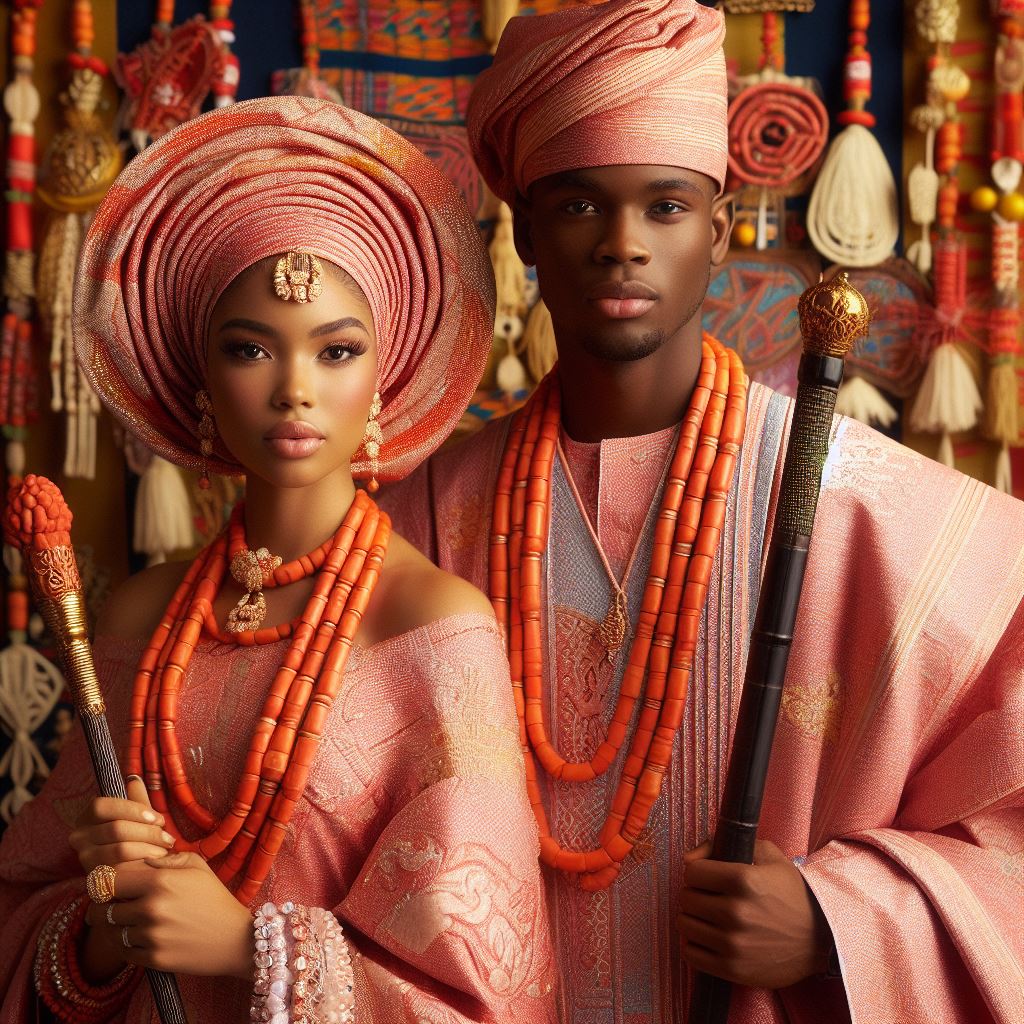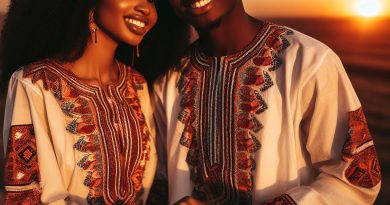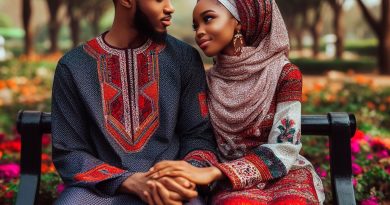Understanding Nigerian Marriage Traditions and Rites
Last Updated on October 23, 2023
Introduction
Let’s explore understanding Nigerian marriage traditions and rites.
Marriage traditions and rites hold a significant place in Nigerian culture, symbolizing unity and heritage.
Nigeria, a diverse and culturally rich nation, boasts a tapestry of vibrant traditions and customs that vary among its numerous ethnic groups.
Among the most fascinating aspects of this cultural mosaic are the intricate marriage traditions and rites that have been cherished and passed down through generations.
These ceremonies, deeply rooted in history and tradition, are more than just rituals; they are a window into the heart and soul of Nigeria’s diverse communities.
The purpose of this blog post is to provide readers with a comprehensive understanding of Nigerian marriage traditions and rites.
In this exploration, we delve into the captivating world of Nigerian marriage traditions and rites, unveiling the symbolic significance, regional variations, and the profound social and cultural importance that these customs hold in the lives of the Nigerian people.
Join us on a journey through a myriad of customs and ceremonies that define the institution of marriage in this captivating African nation.
Pre-Marriage Traditions
Courtship period and introduction of families
In Nigerian marriages, the involvement of families is crucial. From the very beginning, families on both sides play an active role.
During the courtship period, the families get the opportunity to know each other. This period allows them to build rapport, establish trust, and ensure compatibility between the couple.
It is a time of evaluation, where families can identify shared values, beliefs, and goals.
Through regular meetings and interactions, they discuss various aspects of the union and make necessary arrangements for the future.
The courtship period sets a solid foundation for a successful and harmonious marriage.
Bride price negotiation
In Nigerian culture, bride price holds immense cultural value.
It is a payment made by the groom’s family to the bride’s family as a sign of appreciation and recognition. The negotiation process for the bride price is a significant event.
It involves discussions, deliberations, and bargaining between both families. The negotiation serves as a symbolic gesture of respect and unity.
It showcases the commitment of the groom’s family towards taking care of the bride and her well-being.
The bride price negotiation also serves as a way to strengthen the bond between families and validate the authenticity of the union.
Traditional engagement ceremony
The traditional engagement ceremony is a joyous occasion filled with customs and rituals.
It is a celebration of the couple’s intention to marry and an official introduction of the families to each other.
The ceremony is marked by music, dance, and elaborate decoration.
During this event, various rituals are performed, such as the exchange of gifts and blessings.
The bride and groom exchange symbolic items, representing love, prosperity, and fertility.
The families also exchange gifts as a display of goodwill and mutual respect.
This ceremony not only strengthens the bond between the couple but also unites the families, creating a sense of togetherness and shared responsibility.
In short, the pre-marriage traditions in Nigerian culture hold great significance in solidifying the union between families.
The courtship period allows families to get to know each other, ensuring compatibility and harmony.
The bride price negotiation serves as a symbol of respect and commitment.
Lastly, the traditional engagement ceremony brings the families together, celebrating love and creating a strong foundation for the upcoming marriage.
These traditions reflect the importance of family and community in Nigerian society, emphasizing the value placed on unity, respect, and shared responsibility.
Read: The Cultural Significance of Marriage in Nigeria: A Deep Dive
Wedding Preparations
Traditional Wedding Attire
The traditional attire for the bride and groom
The bride’s ensemble is a mesmerizing array of colors, often woven with intricate patterns that mirror her familial heritage.
Beads, a symbol of prosperity, and corals, signifying royalty, grace her neck.
The groom complements her in richly embroidered agbada, exuding regality.
Traditional Wedding Ceremony
The various rituals and customs performed during the ceremony
- The ceremony commences with the ‘Kayan Zance’, the giving of gifts by the groom’s family to the bride’s family.
- The ‘Kooyan Biki’ involves the bride’s family formally accepting the gifts, signifying their approval of the union.
- The ‘Durbar’ procession, a vibrant display of horsemanship, signifies the groom’s arrival with his entourage.
Important elements such as prayers, music, and dances
- Prayers invoke blessings upon the union, seeking harmony and prosperity for the newlyweds.
- Music, often played on traditional instruments like the talking drum, weaves a rhythmic tapestry, infusing the ceremony with an infectious energy.
- Dances, particularly the captivating ‘Sarki’, exude celebration, uniting guests in jubilation.
As preparations unfold, the vivid tapestry of Nigerian wedding traditions comes alive, painting a picture of cultural richness and familial bonds.
From the bride’s resplendent attire to the ceremonial rituals, every element is steeped in meaning, a testament to the profound significance of these unions.
The vibrant colors, the rhythmic beats, and the heartfelt prayers all converge to create a celebration that transcends time, honoring age-old customs while forging new beginnings.
Read: Celebrating Anniversaries: Thanking God for Years Together
Wedding Rites
In the heart of Nigeria’s vibrant tapestry of cultures lies a treasure trove of wedding traditions.
These rituals not only signify the union of two souls but also serve as a profound reflection of the country’s rich heritage.
Let’s delve into the dynamic world of Nigerian wedding rites.
Religious Wedding Ceremony
The influence of religion on Nigerian wedding ceremonies
Religion, a cornerstone of Nigerian society, profoundly influences wedding ceremonies.
From the ornate churches to the elegant mosques, faith permeates every facet of the celebration.
The rituals and rites specific to different religious faiths
Each religious community brings its own set of customs.
The Christian nuptial mass, steeped in prayer and scripture, contrasts sharply with the rhythmic cadence of Islamic Nikah ceremonies.
The Wedding Reception
The importance of the reception in Nigerian weddings
The reception, a crescendo of festivity, is where families and friends congregate to commemorate the newlyweds.
It is the grand stage where the union is celebrated in full splendor.
Common traditions such as the cutting of the cake, speeches, and dances
- The Cutting of the Cake: A symbol of the couple’s shared future, this ritual marks their first collaborative act as spouses.
- Speeches: Heartfelt words from parents, friends, and the couple themselves add an emotional layer to the revelry.
- Dance: From the graceful to the exuberant, dance unites generations in joyous celebration, echoing the rhythm of life itself.
Nigerian weddings, with their diverse religious roots and exuberant receptions, are a testament to the nation’s unity in diversity.
As we dissect these traditions, we gain a deeper appreciation for the intricate threads that weave together the tapestry of love and culture in this remarkable country.
Read: Building a Marriage that Lasts: Lessons from the Bible

Post-Marriage Traditions
Once the wedding ceremony is concluded, the bride embarks on a new journey as she enters the husband’s home.
Entry into the husband’s home
Several customs and rituals are associated with the bride’s entrance into the husband’s home.
These traditions vary across different Nigerian ethnic groups, but they all symbolize the bride’s acceptance into her new family.
One common custom is the “show of respect” where the bride kneels and presents a gift to her mother-in-law.
This gesture signifies her willingness to honor and obey her new family.
Additionally, the bride may be required to perform certain tasks or rituals to prove her worthiness as a wife.
These tasks can range from cooking a traditional meal to demonstrating her domestic skills.
Acceptance and integration into the new family are of utmost importance in Nigerian marriage traditions.
It is crucial for the bride to earn the respect and trust of her new relatives.
By honoring and participating in the customs and rituals associated with her entrance into the husband’s home, the bride conveys her commitment to her new family’s values and traditions.
Celebratory feast and festivities
The next significant post-marriage tradition is the celebratory feast and festivities.
These events are a way to rejoice in the newly formed union and showcase the couple’s happiness.
The post-wedding celebrations hold great significance in Nigerian culture.
They provide an opportunity for the couple to display their wealth and social status.
During the feast, the couple and their families host friends, relatives, and community members.
The guests enjoy a sumptuous meal and partake in various cultural activities, such as traditional dances and music performances.
There are specific customs and activities that are commonly observed during the feast.
One such tradition is the breaking of kolanut, a symbol of hospitality and good fortune, to welcome the guests.
Another popular activity is the spraying of money, where guests shower the couple with cash as they dance.
This gesture is a show of support and well wishes for their prosperous future.
The entire atmosphere during the feast is filled with joy, laughter, and celebration.
It allows the couple and their families to bond with each other and create beautiful memories.
In essence, the post-marriage traditions in Nigerian culture hold immense significance.
The entry of the bride into the husband’s home signifies acceptance and integration into the new family.
Celebratory feasts and festivities provide an opportunity to showcase joy and happiness.
Moreover, by partaking in these customs, couples strengthen their bonds with their families and community.
Read: Marriage Sermon: The Power of Forgiveness and Grace
Conclusion
In this blog section, we’ve explored the rich tapestry of Nigerian marriage traditions and rites. We delved into:
- The diverse ethnic groups in Nigeria, each with unique marriage customs.
- The significance of ceremonies like Igba Nkwu, Yoruba weddings, and Hausa-Fulani traditions.
- Traditional attire, from vibrant Aso Ebi to the elaborate accessories.
- The role of elders, who bestow blessings and wisdom upon newlyweds.
- The symbolism of gifts, reflecting respect, love, and unity.
- The importance of proverbs, music, and dance in these celebrations.
Understanding Nigerian marriage traditions is essential as they are woven into the very fabric of Nigerian culture, fostering unity and preserving heritage.
Embracing these customs not only enriches our knowledge but also strengthens our appreciation for the diversity that defines Nigeria.


